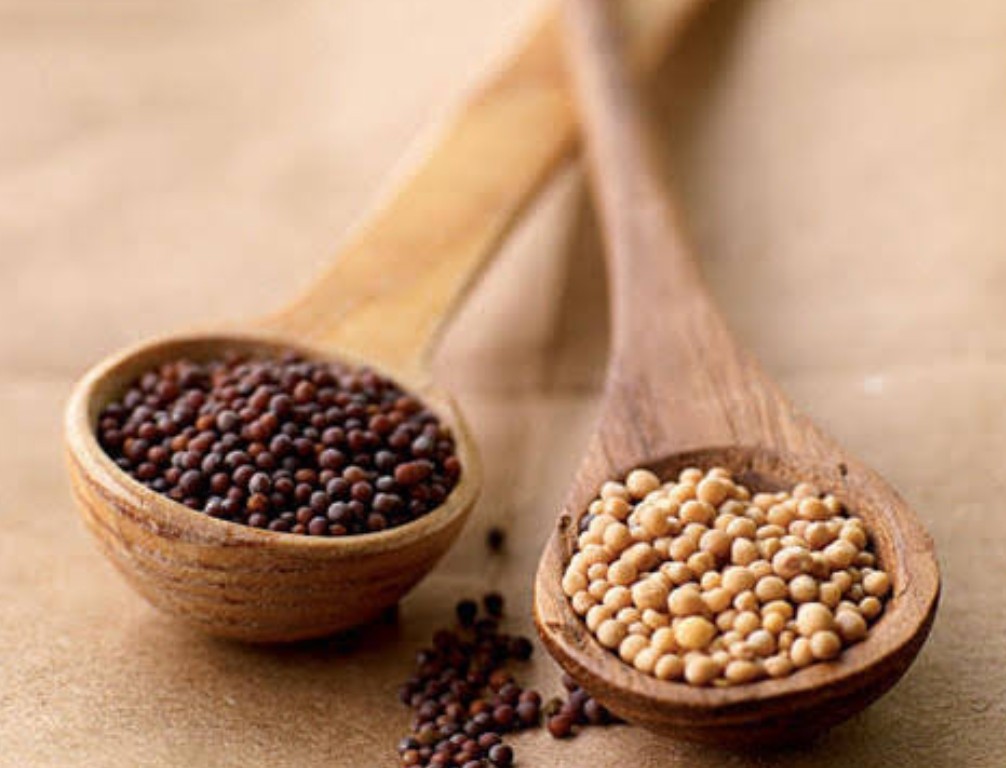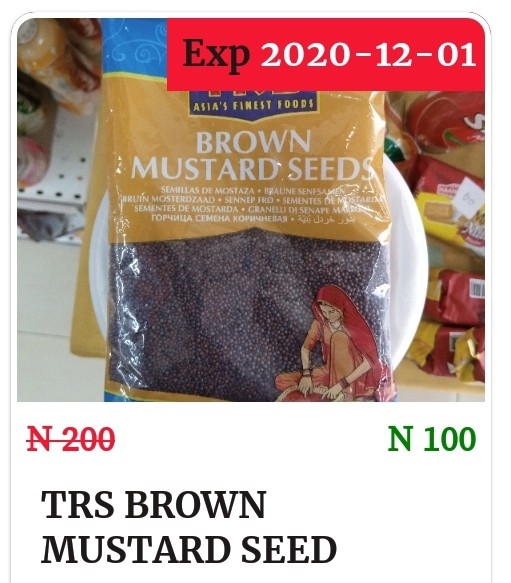What are Mustard seeds?

Mustard seeds are the pungent small round seeds of the over 40 different species of mustard plants; Genus Brassica.
The plant is a very resilient economic plant that can survive even in extreme weather conditions and low soil fertility. Its leaves and swollen leaf stems are used as herbs and eaten as mustard greens but the seeds are the most prominently used.
The seeds are from the 3 most popular mustard species;
Black mustard (Brassica nigra),
Brown Indian mustard (B. juncea) of Himalayan origin,popularly called the Indian, Chinese or oriental mustard seed with dark brown or dark yellow coat.
Yellowish white mustard (Sinapis alba/ B. hirta) of Mediterranean origin.
The diameter of mustard seed range from 1 to 2 millimetres in length.
Use of mustard seeds as a spice dates back to the earliest recorded times, described in ancient Indian and Sumerian texts , mentioned frequently in ancient Greek and Roman scrolls and in the christian Bible.
In the New Testament of the bible,the tiny size of the mustard seed was used to describe how potent a Christian faith can be even when as small in size as mustard seed.
Mustard seed was used medicinally by Hippocrates, among other ancient apothecary.
And in recent age, use of mustard as a spice or condiment in recipes and herbal remedies has grown to the extent that it is by far the largest spice by volume in world trade.
What is mustard seed used for?
The seed and oil from the seed are used to make herbal remedies. For example, the Black mustard oil is used for the common cold, muscles and joints pains and arthritis. Black mustard seed is used as an emetic(substances you ingest to causing you to vomit) especially in the case where harmful substances have been swallowed, for relief of edema(unhealthy retention of water in the body parts) by increasing urine production, and stimulate appetite.
As a food condiment, mustard is sold in three forms: as seeds, as dry powder that is freshly mixed with water for each serving to obtain the most aroma and flavour, and prepared as a paste with other spices or herbs, vinegar or wine, and starch or flour to tone down pungent taste of mustard seeds.
According to the Encyclopaedia Britannica, the differing flavours of white and brown mustard seeds are used in different condiments; the pungent brown is used in French-type paste mustards, and the white is used in milder American- or German-type pastes, while both types are used in English mustard products.
Mustard is widely used as a condiment with various foods, particularly cold meats, sausages, and salad dressings. It is also used as an ingredient in mayonnaises, sauces, and pickles. Mustard plasters were formerly used in medicine for their counterirritant properties in treating chest colds and other ailments.
Brown mustard, which is cultivated as a source of vegetable cooking oil in Pakistan, China, southern Russia, Northern India and Kazakhstan.
The oil is used for food or for industrial purposes, with the residual cake used for animal feed.
What are the health benefits of mustard seed?
– Mustard seeds are rich in selenium,which is known for boosting cell resistance to stress with its high anti-inflammatory ability.
The high source of magnesium in mustard seeds lower the severity of asthma attacks,certain symptoms of rheumatoid arthritis,migraine and lowering blood pressure and with the selenium combine to reduce chances of cancer in those who consume it.
What is the mustard seed in the Bible?
In the Gospel according to Apostle Mathew in Chapter17 verses 19 and 20;
19″Afterwards, the disciples asked Jesus privately, “Why couldn’t we cast out that demon?”
20“You don’t have enough faith,” Jesus told them. “I tell you the truth, if you had faith even as small as a mustard seed, you could say to this mountain, ‘Move from here to there,’ and it would move. Nothing would be impossible”.(New Living Translation)
In this bible account, the size of the mustard seeds is used to show how potent Christian faith can be even if it is as small in size as mustard seed, it is still potent.
Another reference was in the Parable of the Mustard Seed said by Jesus Christ according to the Gospel of Mathew in Chapter 13, verses 31 to 32
31Here is another illustration Jesus used “The Kingdom of Heaven is like a mustard seed planted in a field. 32It is the smallest of all seeds, but it becomes the largest of garden plants; it grows into a tree, and birds come and make nests in its branches.”(New Living Translation).
What are the side effects of mustard seeds?
Taking large amounts of black mustard seed by mouth can damage the throat and can also cause other serious side effects including heart failure, diarrhea, drowsiness, breathing difficulties, coma, and death.
When applied to the skin, especially for a long time, black mustard can cause erythema, skin blisters and eventual skin rupture.
Are mustard seeds poisonous?
They are not poisonous but there are toxicological concerns in some cases. For example, ground mustard seeds contain a toxic compound, isothiocyanate,similar to cyanide found especially in high amounts in immatured cassava roots, that causes airway irritation and edema similar to the experience reported in black pepper.
These two conditions if triggered by the isothiocyanate in the ground mustard seed can be lethal as it compromises aspiration.
Is mustard good for weight loss?
Although eating mustard is not going to giving you a remarkable weight loss, adding the seed to your weight loss plan may give your body an extra fat burning boost.
Several studies indicate that some of the active constituents in mustard, such as capsaicin, also found in pepper fruits and seeds, can help you reach your weight loss goal.
How To Get Mustard Seeds For Free?
Despite the remarkable benefit of this ‘wonder seed’ here is a significant discount for you!

This it It!

